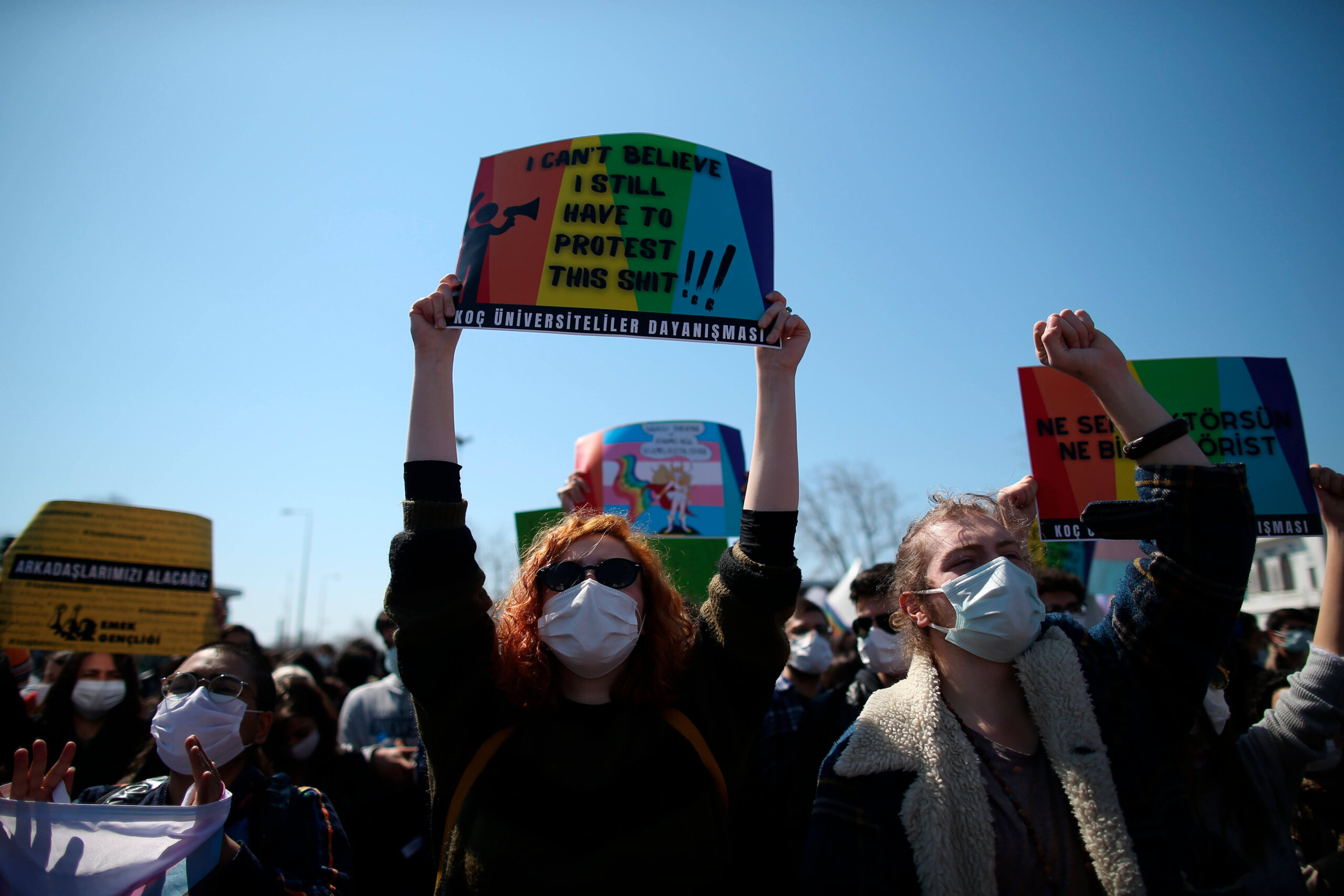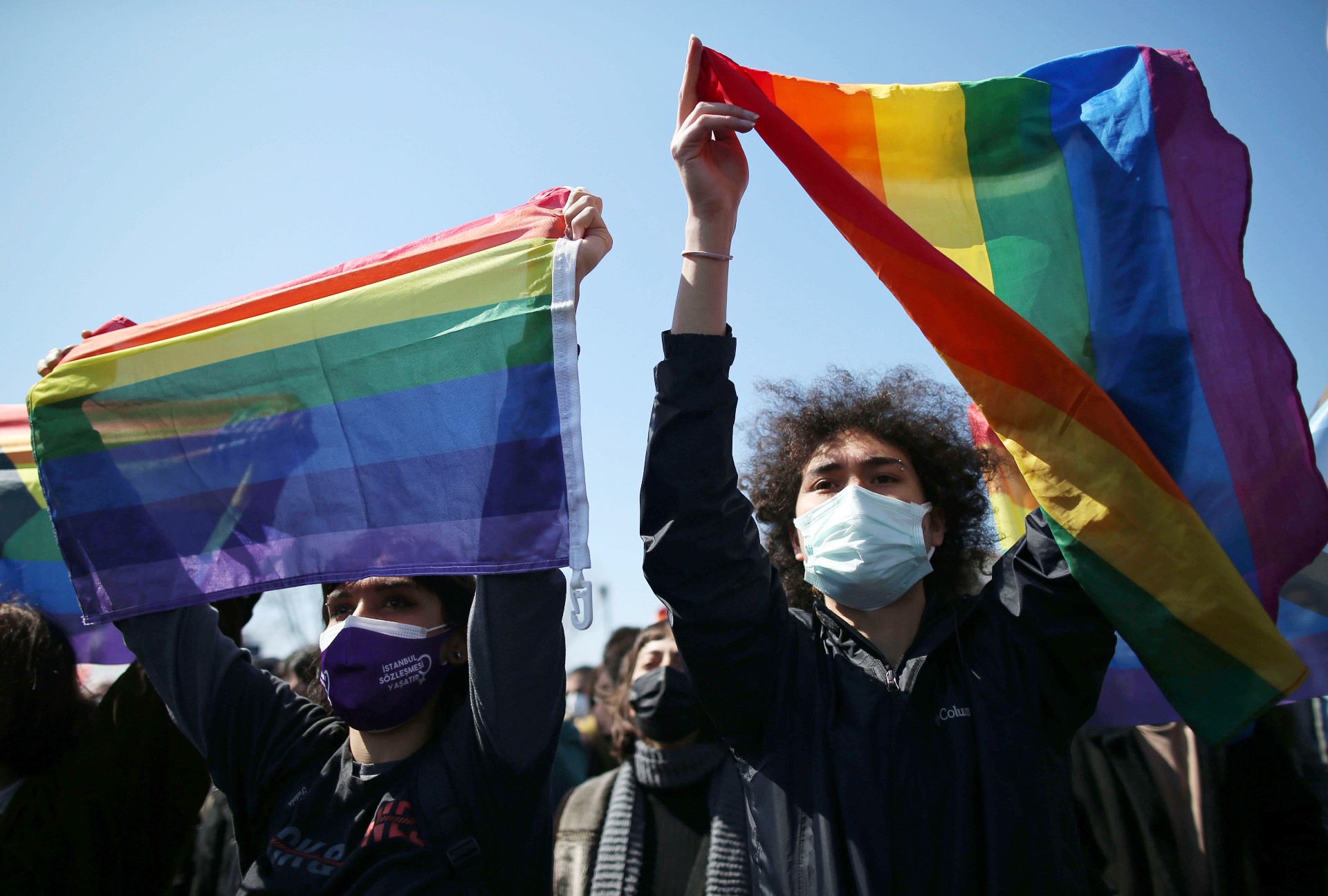Yildiz Tar is a cover model. At least that’s what they joked when Islamic-conservative newspaper Yeni Akit used a picture and video of them alongside a homophobic article in December 2019. “We started a Twitter campaign: Share your cover girl photos. We were sharing, ‘In that year I was in that newspaper and they called me a faggot.’” Tar laughs, recounting how they and other activists reframed the media’s attacks as moments of glamorous notoriety.
Tar is one of the many activists working for LGBTQ+ rights in Turkey amid a sudden uptick in public homophobia from government officials. During a spate of recent protests centred on a rector appointment at the prestigious Boğaziçi University in Istanbul, police targeted student protesters through raids on the LGBTQ+ campus club room, arresting and allegedly assaulting students with pride flags or who presented as queer.
During the protests, major politicians in Turkey also took the opportunity to deride queer people. “LGBT, there is no such thing. This country is national and moral and moves into the future with these values,” Turkish President Recep Tayyip Erdoğan said. Interior Minister Süleyman Soylu, meanwhile, labelled gay people “perverts” on Twitter. And the head of Turkey’s Religious Affairs Directorate, Ali Erbaş, blamed homosexuality for spreading disease during a sermon on the first day of Ramadan.
“LGBTQ+ activism in Turkey has been so successful that the government is rushing to suppress activists.”
According to Tar, the current attacks from the government are part of a longer history of homophobia. In 2017, Ankara’s city government banned all public LGBTQ+ events, claiming they were a threat to “public order” and might incite reactions from “certain segments of society.” Kaos GL, an LGBTQ+ organization where Tar works as the editor-in-chief of its in-house magazine, and trans rights association Pembe Hayat (Pink Life) filed a lawsuit challenging the ban. Tar says their case succeeded in 2020, but then came the COVID-19 pandemic.
Tar believes LGBTQ+ activism in Turkey has been so successful at increasing awareness of queer identities that the government is rushing to suppress activists. “Every social movement has phases: Visibility, then there is a backlash coming from the state, and then the turning point that determines whether we will go through recognition and equality or another scenario.” That pattern is best exemplified by the country’s Pride festivals: The last legally permitted Istanbul Pride parade was in 2014, and more than 90,000 people participated. In the years since, the government banned Pride parades; police met those who tried to march despite the ban with tear gas.
Beyond just visibility, the government’s increased hostility toward LGBTQ+ people is having real effects on providing services to those in need. Aws Kareem used to work with The Aman Project, which provided housing and financial assistance to LGBTQ+ refugees in Turkey. (Xtra has changed Kareem’s last name to protect his safety.) When the organization’s non-profit registration with the government lapsed in 2019, Kareem was hesitant to renew it: Police had already stopped by the shelter without any warning. Following a failed coup attempt in 2016, the Turkish government enacted additional restrictions on non-profits. The restrictions culminated in the government shutting down hundreds of NGOs.

Credit: AP Photo/Emrah Gurel
Left without a licence and worried about police presence, Kareem and the others at The Aman Project shut down the shelter. Kareem says he still gets messages every day and tries his best to crowdsource funds for rent, groceries and medicine.
Kareem says the refugees he works with are a “double marginalized community.” Refugees from Iraq, Iran and Syria living in Turkey have networks of other refugees from their country to rely on even if they face discrimination from Turks. “With LGBT refugees, they are not accepted by the host communities, but they’re also not accepted within their own communities,” he says.
Özge Gökpinar is the fundraising co-ordinator at 17 Mayis, an organization that connects LGBTQ+ people with mental health services and legal assistance. Gökpinar says hate speech is only one problem facing their community. “The laws of Turkey do not protect us,” they say. “There is a bias against us, and this is fostered by the state itself.” According to a 2014 Kaos GL study, “the lack of explicit legal protection for LGBT individuals has amounted to a tacit legal endorsement of acts of violence and discrimination.” The same report also cited homophobic speech by public officials as far back as 2010. Anti-LGBTQ+ views have been a part of the mainstream for years, but the recent attacks by the highest level of government feel different to activists.
“Even though the government has an anti-LGBT agenda, there are still people trying to change the world.”
Gökpinar points to upcoming parliamentary elections as a reason for the government’s increasingly homophobic rhetoric. They believe President Erdoğan is trying to ensure his support among religious, conservative Turks in the 2023 elections by attacking LGBT people. Erdoğan pushes a “family values” agenda, a thinly veiled signal against feminist and LGBTQ+ activists.
These attacks are intertwined with the Erdoğan government’s curtailing of any alternative voices. Turkey has the second highest number of journalists in jail; according to the Committee to Protect Journalists, Erdoğan’s government has “stamped out virtually all independent reporting.” A Turkish prosecutor even filed a case with the constitutional court to close one of the opposition parties two months ago.
In 2020, Kaos GL published a book of oral histories including activists from the group’s early days in the 1990s. “The ’90s [were] really hard, but the activists found a way to survive in that atmosphere,” Tar says. Similar to those who came before them, Tar and other activists continue to write and organize and remake their present.
Tar believes their work at Kaos GL is even more important now. They remember first reading Kaos GL’s magazine when they were a child in the city of Bursa. “There are LGBTQ+ people reading,” they say. “They want to feel that even though the government has an anti-LGBT agenda, even though there are hate crimes, there are still some people trying to change the world.”
Correction: May 21, 2021 4:10 pmA previous version of this story used incorrect pronouns to describe Yildiz Tar. The story has been updated.


 Why you can trust Xtra
Why you can trust Xtra


